REVIEW: Inception
Jul0
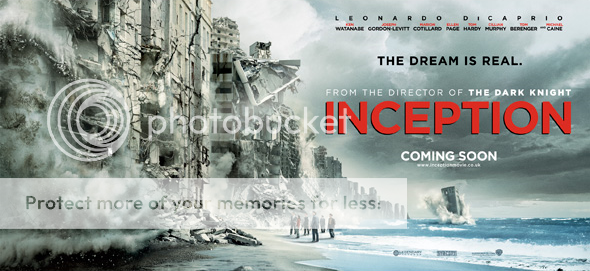
Inception poster ©2010 Warner Brothers, all rights reserved.
“What is the most contagious parasite?” asks Leonardo DiCaprio’s character Mr. Cobb in the early moments of Inception. “An idea.” From the tiniest seed, it spreads like a virus, he explains. This is what makes it vulnerable to manipulation and theft. In many ways, the same could be said for Inception itself. Bending time, delving layers of dreams within dreams, shifting between reality and fantasy, the movie is instantly contagious. By the final shocking scene, when four concomitant worlds finally weave together in a breathlessly taut salvo, one is left downright feverish. It also happens to be one of the smartest, best-written, enigmatic additions to the typically content-light action genre. ScriptPhD.com’s full review of Christopher Nolan’s chef d’œvre under the “continue reading” cut.
REVIEW: “Splice” (includes VIDEO interview with cast + crew)
Jun1

Splice ©2010 Warner Brothers Entertainment, all rights reserved.
About a week and a half ago, scientists achieved a remarkable evolutionary stepping stone in the technological holy grail of eventually engineering synthetic life. Nicknamed ‘Synthia’ by her experimental progenitors, the latest discovery is a viable, self-propagating yeast cell hosting a bacterial Mycoplasma mycoides genome (consisting of non-biological DNA) purely composed in the laboratory. In eerily apt timing, Splice, a new science fiction thriller premiering this week, explores the scientific ramifications and bioethical morass encompassing the creation of a human-animal hybrid by a rogue superstar genetics couple. Under the “continue reading” cut, ScriptPhD.com’s review of Splice, discussion of the expanding frontiers of genetic engineering, and a special video interview with the director/writer, producer and stars of the film.
Earth Week INTERVIEW: ‘Tapped’ Director/Producer Stephanie Soechtig
Apr8
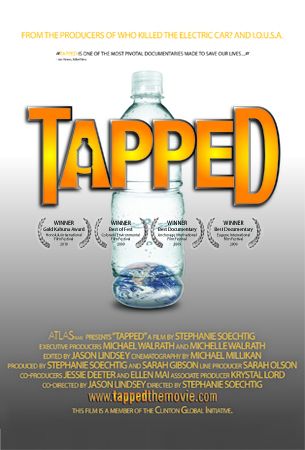
Tapped poster and logos ©AtlasFilms, all rights reserved.
Back in March, we reviewed the stirring documentary Tapped, which chronicles the harmful environmental and health impact of our bottled water addiction. Since our World Water Day 2010 coverage, the filmmakers have embarked on an ambitious “Get Off The Bottle” 30 city, 30 day bus tour, set to conclude on April 22, Earth Day. Tapped director and producer Stephanie Soechtig took time out from the tour to talk to ScriptPhD.com about the tour, their efforts to educate people about bottled water, how the film’s release has impacted her, her wishes for changes in the advertising and marketing of bottled water, and things we can all do to make that happen. Day 2 of our Earth Week coverage continues on the theme of how valuable water is to our environment. For our interview with Stephanie, please click “continue reading.”
Earth Week REVIEW: DisneyNature’s Oceans
Apr0

Oceans film poster and associated images ©DisneyNature Films, all rights reserved.
Happy Earth Week 2010, everyone! Here at ScriptPhD.com, we have devoted a number of articles to environment, sustainability and eco-awareness as part of our continuing “It’s Not Easy Being Green” series. This year, in celebration of the 40th anniversary of Earth Day, we are devoting the entire week to articles, interviews and profiles of companies, individuals and content that raises awareness of sustainability efforts and new ideas for the green science revolution. Because water lies at the heart of most modern environmental crises, we kick off Earth Week with CaptainPlanet’s review of the stellar new DisneyNature documentary Oceans, a truly spectacular oeuvre that celebrates the majesty of our most important and delicate resource. We also include a number of practical, easy things you can do right now to make a difference globally by acting locally. For our Oceans review and to find out what you can do to help protect our Earth’s water supply, please click the “continue reading” cut.
REVIEW: Hubble IMAX—Editor’s Selection
Mar3

Hubble 3D IMAX poster ©2010 Warner Brothers Pictures, all rights reserved.
The Hubble Space Telescope is the world’s first observatory that actually orbits—you guessed it—through outer space. Over the last decade, Hubble has captured some of the deepest and most detailed images of our universe. All those recent headlines about exoplanets: those discoveries come from Hubble. Scientists viewing pictures of light projected from stars over 13 billion years ago (almost at the origin of the universe): that’s Hubble, too. Hubble 3D documents the 2009 mission by the crew of the Shuttle Atlantis to make vital repairs to one of mankind’s most expensive, and significant, science projects. There would be no second chances. If the mission had failed, Hubble would be just another piece of junk orbiting above the earth, like my Direct TV satellite and Elvis’s body. The tension is real, the suspense extraordinary, and the imagery? Out of this world. And fortunately for terrestrial audiences, the entire mission was captured by the crew and director Toni Myers on some of the most breathtaking, brave film ever recorded. We are proud to make Hubble 3D an official ScriptPhD.com Editor’s Selection.
REVIEW: The Crazies
Feb1
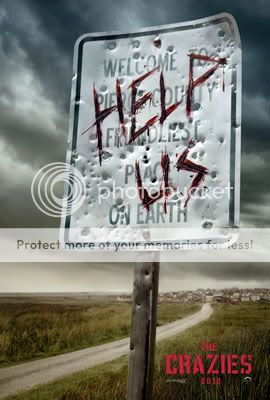
The Crazies poster and images ©2010 Overture Films. All rights reserved.
Esteemed drive-in movie critic Joe Bob Briggs has a single three-word critique of a certain kind of genre picture: “too much plot.” That’s a little easy and dismissive, but it does speak to an underlying truth: the best horror and suspense movies have to be easy to follow, or you’re in trouble. This particular genre is all about being In The Moment, especially if The Moment is designed to scare the heck out of the audience. Forcing them to pause and say, “Hey, wait a minute: why’s he doing that? Who’s that guy again? Why is he doing that?” rips the viewer out of that Moment. A better formula is to keep it simple. Or even better: keep it relentless. Out in theaters today is the well-made, competent, if flawed, bio-horror thriller The Crazies. Ironically enough, while The Crazies has some not-so-crazy plot and technical problems, the biology and science of this movie (with some minor exceptions) are the most enjoyable part. ScriptPhD.com full review and discussion under the “continue reading” cut.
It’s Not Easy Being Green: Mountaintop Removal
Feb0
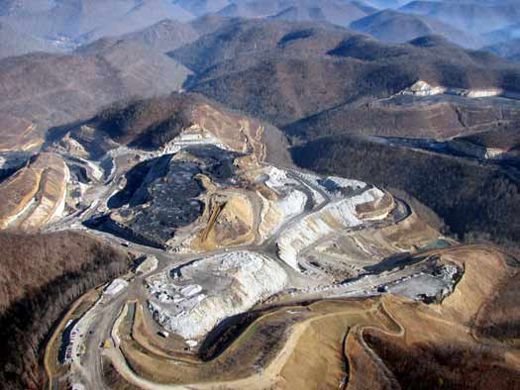
An Appalachian mountain that has been decimated by coal mining.
One of the most pressing issues of our time is how and where we are going to get sustainable energy for a global population with a rapidly rising standard of living and the consumption that this entails. Approximately 10% of United States coal production [coal in general accounts for 40% of global electricity production] is procured through mountaintop removal, an environmentally-devastating extraction that literally involves blasting off (or removing) the top of a mountain to extract the coal inside. The practice gained popularity in the 1960s, when it started becoming too difficult and too costly to extract coal from underground mines. In our continuing “It’s Not Easy Being Green” series, ScriptPhD.com’s eco-blogger Captain Planet talks about the documentary Mountaintop Removal, exactly what it entails, and why this process is so much more costly than the immediate energy gained from it. Please click “continue reading” for more.
On ‘Creation’, Charles Darwin, and Survival of the Fittest
Jan0
There is grandeur in this view of life, with its several powers, having been originally breathed into a few forms or into one; and that, whilst this planet has gone cycling on according to the fixed law of gravity, from so simple a beginning endless forms most beautiful and most wonderful have been, and are being, evolved.

Charles Darwin
Charles Darwin’s postscript to perhaps the greatest work of biology ever recorded, The Origin of Species, ignited an acrimonious debate about science, religion, the mutual exclusivity thereof, and where we come from. 150 years later, as we celebrate the anniversary of Darwin’s monumental scientific achievement, it is a debate that has yet to abate. Regardless of what stance one takes on evolution and natural selection, fascination with the life and times of this inimitable figure is undeniable. A new biopic, Creation, delves into the dichotomy of Darwin the naturalist and family man, the disapproval he faced from a devotedly Christian wife, and the inner anguish he faced in whether to publish his findings. ScriptPhD.com’s Stephen Compson was recently treated to a private screening of the film and had the extraordinary opportunity to sit down with Darwin’s great-great-grandson Randal Keynes, whose Charles Darwin biography the movie was based on. For our exclusive content, please click “continue reading.”
REVIEW: The Book of Eli (Bleak Chic with a Christian Twist)
Jan1
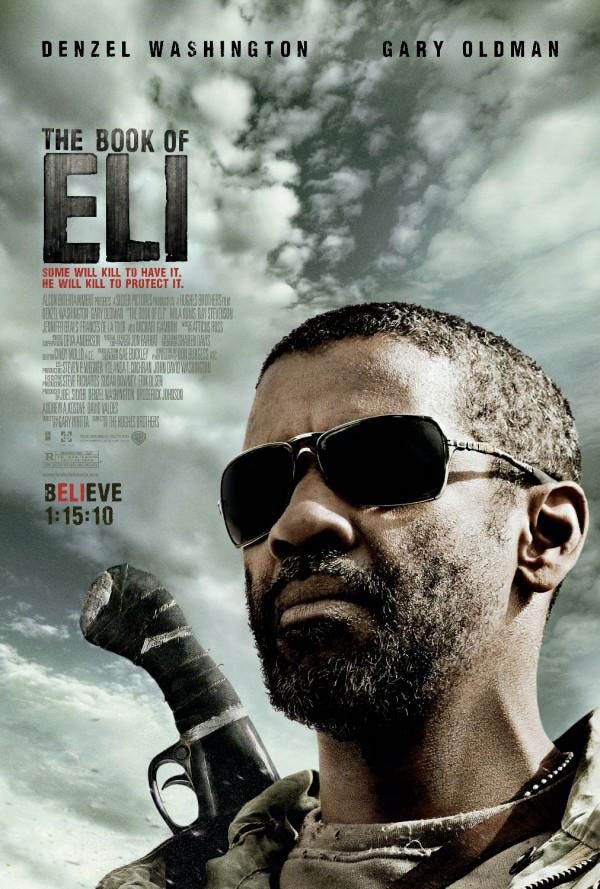
The Book of Eli film poster ©2010 Warner Brothers Pictures, all rights reserved.
Picture this: a mysterious Man with No Name comes into a tiny desert town that’s dominated by a manipulative and powerful bossman. He has something the bossman wants and won’t give it up – and No Name is an almost supernaturally powerful fighter; you really don’t want to mess with him. Before the battle between Good and Evil is over, the Man with No Name has decimated the bossman’s thug-army and brought the evil leader low, the dusty little settlement is either burned to the ground or better off than before he arrived, and off he goes, continuing his mysterious journey – always in motion, never at peace. Except for a tie-‘em-up ending that’s tacked on to the back of The Book of Eli, that’s pretty much what you’ve got here: a post-apocalyptic tale of the mysterious hero vs. the bully prince, just like an old Sergio Leone/Clint Eastwood spaghetti western. Just replace Eastwood with Denzel Washington, replace the Old West with the near future after a global catastrophe, cast a painfully over-the-top Gary Oldman as the Bad Boss, give newcomer Mila Kunis the inevitable pretty girl/spunky sidekick role, and you’re golden. Or at least should have been. Unfortunately for the viewing audience, there’s more Sergio Leone than Cormac McCarthy in this ponderous and unconvincing post-apocalyptic allegory. For a full review, please click “continue reading”.
GUEST POST: On Chemistry, Movies and Making Science Entertaining
Jan2
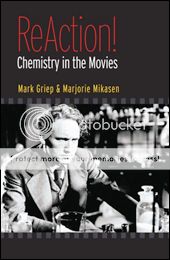
Reaction! Chemistry in the Movies is an Oxford University Press title. ©2009, all rights reserved.
One of my favorite movies as a kid, and now, as a professional scientist, is Andromeda Strain. The heroes are mostly older, professorial types who work feverishly to understand an alien organism and save the planet. After being asked to review ReAction! Chemistry in the Movies for ScriptPhD.com, I was so curious to consume (with relish) the book’s guesswork about the chemistry found in Andromeda Strain. After returning to the beginning of the book and giving it a read, I was thrilled to find that ReAction! is a detailed, thoughtful exploration of the representation of chemistry in film. The book addresses, first and foremost, the fact that chemistry can play a lead role in film. The authors also discuss the dichotomy between the “dark” and “bright” sides of chemistry (and science) as illustrated by films in which chemistry or chemists play a central role. Also included are several playful explorations of the real science behind some famous examples of fictional chemistry in film. After the break is a full review of the book along with an in-depth interview with authors Mark Griep and Majorie Mikasen on the process of working together as chemist and artist, portrayal of chemists in film and how film can change public perception in science.

















